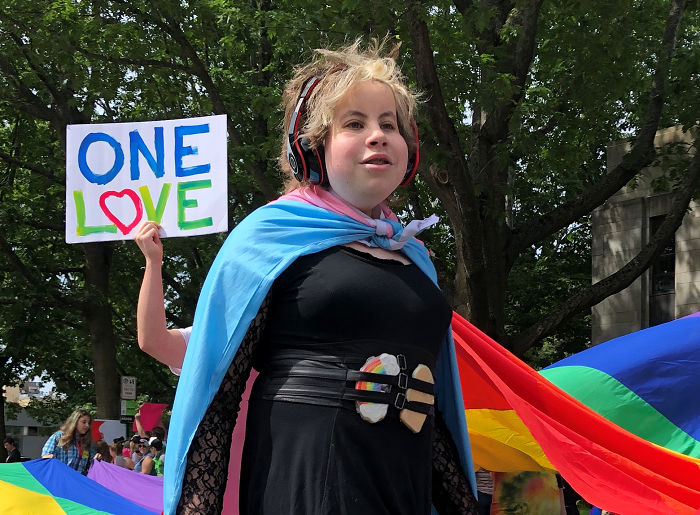 Update – February 27, 2020: It is our pleasure to share that the individual featured in this story now uses she/her pronouns and goes by the name Iris. She continues to be seen at Seattle Children’s Gender Clinic and advocate for gender affirming healthcare.
Update – February 27, 2020: It is our pleasure to share that the individual featured in this story now uses she/her pronouns and goes by the name Iris. She continues to be seen at Seattle Children’s Gender Clinic and advocate for gender affirming healthcare.
In celebration of LGBTQ+ Pride Month, On the Pulse shares a story about 17-year-old Torin, a Seattle Children’s patient who battled cancer. After years of treatment and rehabilitation, Torin is now standing strong, yet continues to face challenges that come with identifying as gender non-binary. Torin talks about their struggle and overcoming oppression by not being afraid to express their authentic self.
From as early as Torin could remember, they used writing as a way of expressing emotion.
“I knew I loved writing when I wrote my first series of stories in elementary school,” Torin said. “They were about the adventures of ‘Pencil Man,’ a superhero who had the power to draw and erase things.”
Although Torin finds the plot of the story silly now, it serves as a poignant theme in their life.
Each individual should have the power to create their own story and be true to themself.
That’s why Torin is proud to identify as gender non-binary, meaning Torin does not identify as having only masculine or feminine qualities, but to be on a gender spectrum.
“Our society tends to recognize only two genders associated with being male or female,” Torin said. “I don’t fall into either of those categories.”
As society is constructed to see only two genders, it’s not unusual that individuals like Torin are misidentified using the pronouns ‘her/his’ or ‘she/him.’
“I’m often mis-gendered,” Torin said. “Because I don’t physically look masculine nor feminine, people will make assumptions about me.”
Individuals who are gender non-binary often use the pronouns ‘they/them.’
In addition to being uncomfortable when people incorrectly assume their gender, Torin also feels the impact of negative attitudes directed at the LGBTQ+ community today.
“People at school think it’s funny to use homophobic slurs,” Torin said. “While they fortunately haven’t been targeted at me, it’s still painful to hear.”
However, Torin is a skilled warrior. Not only has Torin practiced Kajukenbo Kung Fu, a hybrid martial art that combines karate, jujutsu, kenpo and Chinese boxing, for most of their life — Torin also tackled cancer of the brain and spine.
The first of many challenges
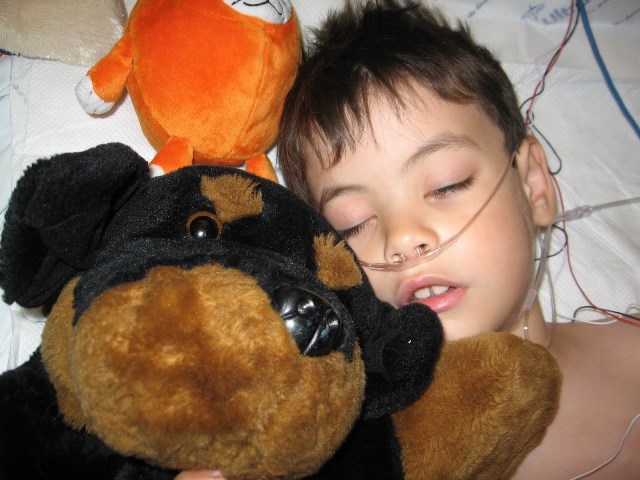 On their flight home from a family trip in Puerto Rico in February of 2009, Torin, 6 years old at the time, began to exhibit symptoms that signaled something was wrong.
On their flight home from a family trip in Puerto Rico in February of 2009, Torin, 6 years old at the time, began to exhibit symptoms that signaled something was wrong.
“Torin had a terrible headache and was throwing up,” said Lisa, Torin’s mother. “When we were home, we spent a week in and out of the emergency department. It was apparent that this was more than just a simple virus.”
Torin was eventually transferred to Seattle Children’s where they did an MRI, which showed that Torin had hydrocephalus.
Hydrocephalus is a harmful buildup of cerebrospinal fluid (CSF) in the ventricles of the brain. CSF is a clear fluid that bathes and protects the brain and spinal cord, and ventricles are the spaces in the brain where CSF is made. When CSF cannot flow or does not get absorbed the way it should, fluid builds up. The buildup puts pressure on the brain, which can be deadly if it goes untreated.
Torin was given a shunt, which is a device used to drain fluid from the brain.
“For the next six months, I kept Torin under a microscope,” Lisa said. “The hope was that the underlying issue would resolve, but Torin wasn’t thriving and in fact, was becoming less active and more frail.”
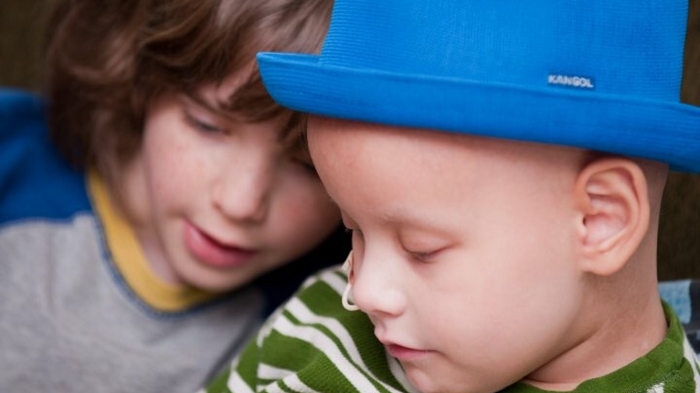 Torin’s MRI showed a coating over their brain and spine, but it wasn’t in an area that was easy to biopsy. Finally, in September 2009, Torin’s symptoms had worsened and the areas of enhancement had grown enough that a sample could be safely removed from the spine.
Torin’s MRI showed a coating over their brain and spine, but it wasn’t in an area that was easy to biopsy. Finally, in September 2009, Torin’s symptoms had worsened and the areas of enhancement had grown enough that a sample could be safely removed from the spine.
“That’s when we found out Torin had a diffuse high-grade tumor,” Lisa said. “It was devastating to hear.”
The 10 months of treatment that followed, involving radiation and chemotherapy, took a massive toll on Torin’s body.
“Torin became so sick from the radiation and chemotherapy that they were hospitalized numerous times,” Lisa said. “For almost half of the 10 months of treatment, Torin was inpatient to control pain, treat infections and receive blood transfusions.”
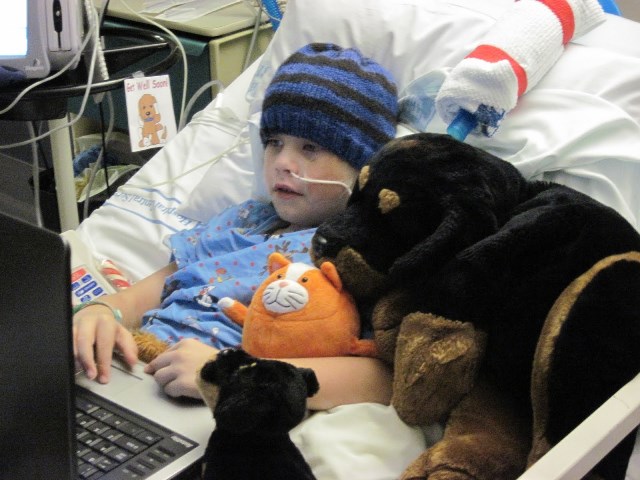
During those months of being away from home and a normal childhood, Torin was made to feel just like any other kid through the care and support from Seattle Children’s Child Life team.
“Torin became really close to one of the child life specialists,” Lisa said. “They also enjoyed seeing the therapy dogs and visits from the art therapist. Everyone was so good to us.”
Torin’s tumor responded very well to treatment but their body was severely affected.
“Torin had to go through intensive outpatient rehabilitation,” Lisa said. “They received physical therapy to regain the ability to walk, as well as occupational and speech therapy.”
As time passed, Torin’s motor skills began to improve.
“Torin’s care team provided amazing care to help them recover,” Lisa said. “I’m so grateful for that.”
Finding their true self
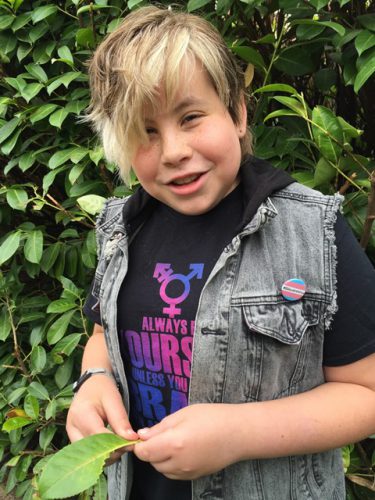 After missing almost three years, Torin went back to school regularly.
After missing almost three years, Torin went back to school regularly.
Torin recalled that middle school was the time when they began exploring the meaning of gender and sexuality.
“In seventh grade, I began questioning my sexuality,” Torin said. “In ninth grade is when I began questioning my gender.”
Torin often didn’t feel comfortable in their body. It didn’t look or feel the way they wanted it to, especially as they began to go through puberty. Torin now understands that they were experiencing gender dysphoria.
A moment during a school camping trip evoked a thought that opened Torin’s eyes to seeing gender through a different lens.
“I was getting my nails painted when it occurred to me that it was okay if I wasn’t super masculine,” Torin said. “I realized that I didn’t have to present as male and that there was a disconnect of how I wanted to be seen and identified and what society was telling me I should be.”
For Torin, that’s what Pride is all about.
“Pride to me means dressing and acting how I want and not how I’m expected to,” Torin said. “Basically, it’s being very fabulous and not feeling ashamed of it.”
Lisa knows the shame that comes with being open about gender and sexuality and does her best to give Torin all the support they need in a world that may not be kind to individuals like Torin.
“I love and support Torin however they are,” she said. “Seeing that my kid feels comfortable in their body is what matters.”
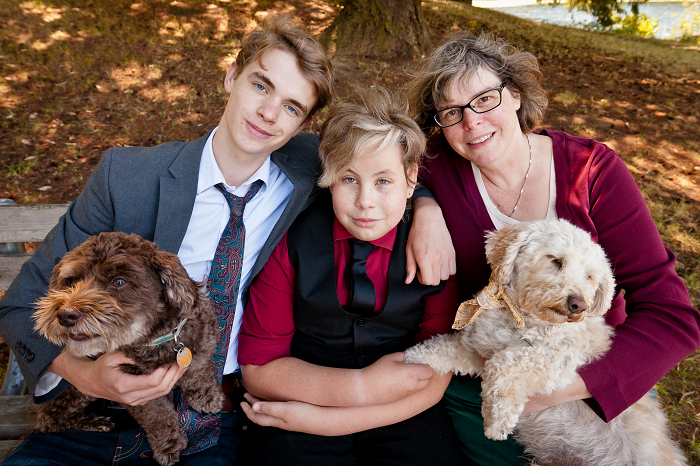 Lisa also considers Seattle Children’s as a consistent source of support.
Lisa also considers Seattle Children’s as a consistent source of support.
“Children’s has been amazing,” Lisa said. “They have been with us through every step of the way, through Torin’s cancer and follow-up care and now with the Gender Clinic.”
As the only multidisciplinary clinic in the region for youth who are transgender or gender nonconforming, Seattle Children’s Gender Clinic has been a beacon of hope for individuals like Torin.
The Gender Clinic stands strong in providing children, adolescents and young adults with treatments based on the American Academy of Pediatrics policy statement that ensures support and care for a traditionally underserved population that faces numerous health disparities.
In recognition of the support for the LBGTQ+ community, the Gender Clinic was honorably selected to be one of the 45th Annual Seattle Pride Parade’s grand marshals.
Torin hopes that with organizations like Seattle Children’s that advocates for gender diversity will help open doors to educating others on what it means to be gender non-binary and the importance of accepting individuals for who they are, not by their gender.
Torin has a simple message to others struggling with their gender identity or sexuality.
“Whoever you are and however you represent yourself, remember one thing — you are valid.”

